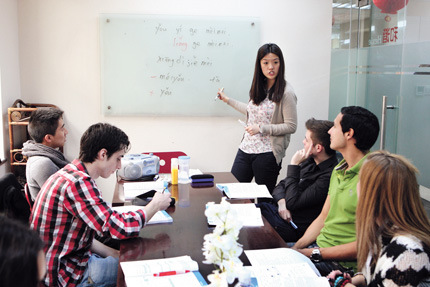Learning the Local Lingo

Foreigners have a Manderin class at a language school in Shanghai. For most foreigners who want to learn Chinese, there are basically two ways: a language school or hiring a private tutor. Photo by Wang Rongjiang
The Mandarin teaching market has become increasingly competitive and experts in the field say many private tutors are struggling to survive. Qu Zhi takes a look at how the various options benefit students in different circumstances.
Good pay, flexible schedule, easy work - when it comes to teaching Mandarin to foreigners, most people think it's a piece of cake for Chinese teachers. However, those in the industry say it's actually difficult to survive in today's changing market.
Shi Xudeng, deputy director of the International College of Chinese Studies in East China Normal University, says teaching Mandarin isn't as easy as some think.
Shi says that increasing competition in the market means there is an abundant supply of teachers in China.
For most foreigners who want to learn Chinese there are basically two ways: a full-time language school in established universities and private training centers or hiring a private tutor.
Foreigners working full time may find private training centers or private tutors an ideal choice as they usually charge reasonable prices and scheduling is flexible. But does this mean professional language schools are at a disadvantage?
Yao Yuan, a lecturer at Shanghai International Studies University's College of Teaching Chinese as a Foreign Language, doesn't think so.
"Both professional and private institutions help the market in separate ways. For colleges, it is more suited for students who want to learn Chinese systematically or get a qualification such as HSK level 6," Yao says.
Those who don't have time for full-time enrollment at school will likely find private tutors the best option since most will come to your home.
The key to this option is finding a relatively experienced teacher, experts say.
Private tutors such as Cindy say that although they enjoy their work it is not easy.
"I do enjoy my work, but it can be exhausting as well. I have to travel all over the city to meet my students and I spend a lot of time to ensure lessons are thoroughly prepared."
Despite the hard work, payment can be low and is negotiated between student and teacher. Furthermore, classes in private schools often struggle to attract more than four people at a time.
Shi says: "Private Mandarin tutors are more like blue-collar workers these days… The fee can be as low as 50 yuan per hour."
It may seem harsh, but this is the reality faced by many of the city's young language professionals.
An Englishman on a three-year assignment in Shanghai with his wife, who declines to disclose his name, is now learning Chinese with a private tutor.
"I find Mandarin very difficult to learn, even though I'm only focused on learning spoken Mandarin," he says. "My way of learning European languages is to picture words and to learn language structure, but somehow this doesn't work for me in China."
The use of tones, complicated use of words and huge gap between learning methods are problems Chinese teachers need to overcome. Professional teachers now realize that focusing on rote learning and memorization are not always the best ways to teach foreigners Chinese. They find a more open-minded and fun approach to teaching can benefit their students.
Still, Shi says, "A comprehensive education plan is essential for some students." In these cases, college professionals have an advantage.
Shi also counters the myth that one is qualified to teach Mandarin just because they have mastered both Chinese and English.
"Teaching Chinese as a foreign language is actually a very specialized subject. A person with only some knowledge of Chinese is definitely not qualified as a teacher," Shi says.
He also says that the use of English teaching at many non-professional organizations is bound to reduce the efficiency of Mandarin learning.
New Zealander David enjoys living in Shanghai very much, especially the process of learning Mandarin.
News&Opinion
 more
more- Learning the Local Lingo
- Botswana Urged to Emulate China in Education
- Planning Your Study in China
- Old Views are Changing on Overseas Education
- Chinese Athletes Train Harder than any in the Wo...
- Foreign Interns Seek Experience in Chinese Firms
- Students Get Chance for US Trip
- The Second International Chinese Teachers' Devel...
Policy&Laws
Regulations on Academic Degrees of the People’s ...
Regulations on Academic Degrees of the People’s Republic of China ...
Cross-Straits Business Plan Contest Held at Zhej...
On July 4th, more than a hundred students from 13 universities cross...
Interim Regulations for Admiinistration and Esta...
Article 1 These Regulations are formulated with a view to providing ...





 print
print  email
email  Favorite
Favorite  Transtlate
Transtlate 







